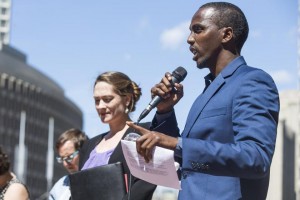Widgetized Section
Go to Admin » Appearance » Widgets » and move Gabfire Widget: Social into that MastheadOverlay zone
Civil rights groups protest federal program to combat extremism, saying it targets Muslims
 Said Ahmed of the United Somali Youth spoke during a news conference to draw attention to government agencies’ plans for “Countering Violent Extremism” programs on the steps of Boston City Hall Thursday.
Said Ahmed of the United Somali Youth spoke during a news conference to draw attention to government agencies’ plans for “Countering Violent Extremism” programs on the steps of Boston City Hall Thursday.
Islamic and civil rights groups in Boston and two other cities spoke out Thursday against a federal government initiative to counter violent extremism, saying it unfairly targets the nation’s Muslim communities.
Boston, Los Angeles, and Minneapolis were chosen last fall as sites for the program known as Countering Violent Extremism, which is designed to reduce the risk of young people being recruited by extremist groups. The organizations that convened Thursday on City Hall Plaza — including the Council on American-Islamic Relations Massachusetts Chapter, the Muslim Justice League, and other social justice organizations — said the federal program is pocked with shortcomings.
“There’s no evidence programs like this are effective,” said Liza Behrendt, organizing consultant for Jewish Voice for Peace, an antidiscrimination group. “It’s a federal program that singles out Muslim communities and reinforces false notions of the link between Islam and terrorism.”
Nadeem A. Mazen, a Cambridge city councilor, called the program “authoritarian.” He urged an alternative approach that would increase community engagement and community policing, rather than using “violent practices like surveillance and racial profiling.”
Shannon Erwin, cofounder of the Muslim Justice League, said the program could rely on false indicators to identify potential at-risk youths, targeting people who grow beards, express interest in foreign policy, and adhere to strict religious beliefs.
But community organizations participating in the campaign to combat extremism denied that the initiative engages in discriminatory practices.
“I’m not aware of a checklist of indicators people are supposed to follow,” said Robert Trestan, regional director of the Anti-Defamation League in Boston. The initiative to counter extremism “is relatively new in this country. It’s not fair to judge it yet and be overly critical.”
According to Trestan, the Boston program is inclusive, “informed by all segments of society,” and incorporates the voices of community organizations, faith-based groups, neighborhood associations, Muslim organizations, and law enforcement officials.
Said Ahmed, founder of United Somali Youth, disagrees, saying the conversation between the government program and members of the community has been limited. The initiative, he said, “is not open to all people. Our community cannot give feedback,” said Ahmed, whose group aims to empower immigrant youths.
The office of US Attorney Carmen Ortiz rejected assertions that the Boston program is singling out groups.
“The local effort does not focus on any one form of violent extremism, and does not identify a particular community as being more vulnerable or at risk of engaging in violent extremism,” said Brandy Donini-Melanson, a spokeswoman for the US attorney’s office, in an e-mail.
The framework used to establish the program in Boston pledged to use prevention and intervention approaches to “protect vulnerable individuals from engagement in . . . violent extremism.” Strategies include expanding intervention programs in schools, combating extremist ideologies on the Internet, and providing specialized support and services to people convicted of hate crimes before and after they are released from prison.
Andrew P. Cohen, a board member of the Jewish cultural and social justice group Boston Workmen’s Circle, said the federal program to counter extremism is reminiscent of the discrimination Jewish communities encountered in the past.
“Any program where Muslims are being targeted as having a propensity to violence is problematic,” Cohen said.
Rosa Nguyen can be reached at rosa.nguyen@globe.com.

Figradihiina